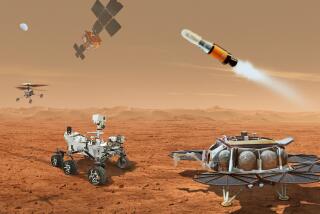The Times Poll: 3 Out of 4 Back Shuttle Program
- Share via
Despite widespread doubts among the American public about NASA’s decision to approve the launch of the space shuttle Challenger that ended in disaster last month, three out of four Americans still support the space shuttle program and an equally overwhelming majority opposes reducing NASA’s budget, according to the latest Los Angeles Times Poll.
With evidence mounting that officials of the National Aeronautics and Space Administration ignored warnings from engineers about the possible dangers of launching the space shuttle in cold weather, 50% of the American public believes that NASA made “serious errors of judgment,” while 37% say the decisions made by space agency officials were “prudent.”
Moreover, most Americans have qualms about allowing private citizens, such as teachers and journalists, to go along as passengers on space shuttle flights. Of those surveyed, 59% said they thought the main idea behind allowing private citizens aboard the shuttle was to help NASA get more publicity so Congress would approve greater space funding, while only 31% believed there was a “legitimate necessity” for such efforts.
Yet, whatever their attitude about NASA’s decision making, Americans remain strong boosters of the space program. Even among those who question NASA’s judgment in launching the Challenger, 75% consider themselves supporters of the space shuttle program and 69% oppose cuts in spending.
Although Americans are less inclined to boost spending or expand NASA’s programs, half of the public supports building another orbiter for the space shuttle program to replace the lost Challenger and approves of plans by the Reagan Administration to spend an estimated $8 billion on a new permanent platform in outer space.
Replacement Sought
Government officials already are pressing for approval to replace the destroyed Challenger shuttle with a new orbiter. On Wednesday, both acting NASA chief William R. Graham and a top Pentagon official told a congressional panel that they would like to see a new shuttle built to restore the fleet of reusable space vehicles to four.
When asked about replacing the Challenger, 52% of the public said they would go along with spending an estimated $1.5 billion on a new shuttle, while 42% opposed the expenditure.
The telephone poll of 2,241 people, conducted from Feb. 20 to 25, found only a slight falloff in support for the space program since the Challenger blew up a month ago, killing all seven crew members aboard, including teacher Sharon Christa McAuliffe.
For example, an earlier poll, conducted in mid-February by the Washington Post and ABC News, found that 83% of the public favored continuing the shuttle program.
The Times poll, supervised by director I. A. Lewis, was conducted as the presidential commission investigating the disaster opened public hearings this week focusing on the decision to launch the shuttle over the objections of engineers of the firm that made the shuttle’s solid rocket boosters.
Seal a Prime Suspect
A failure in one of the rubber O-ring seals that held together the right booster’s segments, possibly affected by the unprecedented cold temperatures, is the prime suspect in the search for a cause of the explosion.
The American public showed little inclination to alter the emphasis in the space program from manned to unmanned flights. About 41% were satisfied with the current approach, with 24% favoring more emphasis on unmanned space flight and 27% supporting more use of space missions relying on astronauts.
Asked if they would like to fly in the space shuttle on a future mission, 57% of the public said no, while 41% said they would like to volunteer.
The sampling error of the poll was plus or minus 3%, which means that the results could vary by three percentage points in either direction if every adult in the country had been interviewed on the same questions.
More to Read
Sign up for Essential California
The most important California stories and recommendations in your inbox every morning.
You may occasionally receive promotional content from the Los Angeles Times.









